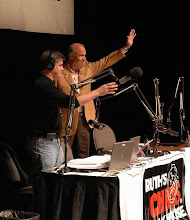I'm embarrassed to say that before I watched "A Beautiful Mind" I had no idea who Nash was. And, until our current recessionary woes, I also had never heard of Keynesian Economics. Well, I have now...
The following is an excerpt from a piece (presentation, class materials, etc.) Nash has on file via his faculty website at Princeton:
"Keynesians"
The thinking of J. M. Keynes was actually multidimensional and consequently there are quite different varieties of persons at the present time who follow, in one way or another, some of the thinking of Keynes. And of course SOME of his thinking was scientifically accurate and thus not disputable. For example, an early book written by Keynes was the mathematical text "A Treatise on Probability".
The label "Keynesian" is convenient, but to be safe we should have a defined meaning for this as a party that can be criticized and contrasted with other parties.
So let us define "Keynesian" to be descriptive of a "school of thought" that originated at the time of the devaluations of the pound and the dollar in the early 30's of the 20th century. Then, more specifically, a "Keynesian" would favor the existence of a "manipulative" state establishment of central bank and treasury which would contin-uously seek to achieve "economic welfare" object-ives with comparatively little regard for the long term reputation of the national currency and the associated effects of that on the reputation
of financial enterprises domestic to the state.
And indeed a very famous saying of Keynes was "...in the long run we will all be dead ...".
A Critique of the Science of the Keynesians
It is difficult to make a criticism here because so much of the scientific research work, particularly of American economists, in the years since, say, "the thirties", has been in the area of the study of the topic called "macroeconomics" and most or almost all of this work has a "Keynes-ian" orientation.
It is difficult to make a criticism here because so much of the scientific research work, particularly of American economists, in the years since, say, "the thirties", has been in the area of the study of the topic called "macroeconomics" and most or almost all of this work has a "Keynes-ian" orientation.
I think there is a good analogy to mathematical theories like, for example, "class field theory". In mathematics a set of axioms can be taken as a foundation and then an area for theoretical study is brought into being. For example, if one set of axioms is specified and accepted we have the theory of rings while if another set of axioms is the foundation we have the theory of Moufang loops.
So, from a critical point of view, the theory of macroeconomics of the Keynesians is like the theory of plane geometry without the axiom of Euclid that was classically called the "parallel postulate". (It is an interesting fact in the history of science that there was a time, before the nineteenth century, when mathematicians were speculating that this axiom or postulate was not necessary, that it should be derivable from the others.)
So I feel that the macroeconomics of the Keynesians is comparable to a scientific study of a mathematical area which is carried out with an insufficient set of axioms. And the result is analogous to the situation in plane geometry, the plane does not need to be really flat and the area within a circle can expand hyperbolically as a function of the radius rather than merely with the square of the radius. (This picture suggests the pattern of inflation that can result in a country, over extended time periods, when there is contin-ually a certain amount of gradual inflation.)
John F. Nash currently teaches at Princeton University





